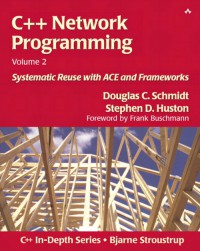
|
FreeComputerBooks.com
Links to Free Computer, Mathematics, Technical Books all over the World
|
|
- Title C++ Network Programming, Volume 2: Systematic Reuse with ACE and Frameworks
- Author(s) Douglas C. Schmidt, Stephen D. Huston
- Publisher: Addison-Wesley Professional; 1 edition (November 8, 2002)
- Paperback: 384 pages
- eBook: PDF
- Language: English
- ISBN-10: 0201795256
- ISBN-13: 978-0201795257
- Share This:

|
Do you need to develop flexible software that can be customized quickly? Do you need to add the power and efficiency of frameworks to your software? The ADAPTIVE Communication Environment (ACE) is an open-source toolkit for building high-performance networked applications and next-generation middleware. ACE's power and flexibility arise from object-oriented frameworks, used to achieve the systematic reuse of networked application software. ACE frameworks handle common network programming tasks and can be customized using C++ language features to produce complete distributed applications.
This book focuses on ACE frameworks, providing thorough coverage of the concepts, patterns, and usage rules that form their structure. This book is a practical guide to designing object-oriented frameworks and shows developers how to apply frameworks to concurrent networked applications.
This book also teaches how to use frameworks to write networked applications quickly, reducing development effort and overhead. It will be an invaluable asset to any C++ developer working on networked applications.
About the Authors- Dr. Douglas C. Schmidt is the original developer of ACE and The ACE ORB (TAO). He is a Professor at Vanderbilt University, where he studies patterns, optimizations, middleware, and model-based tools for distributed real-time and embedded systems.
- Stephen D. Huston is President and CEO of Riverace Corporation, a provider of technical support and consulting services to companies who want to keep software projects on track using ACE.
- The C++ Programming Language
- Network Programming
- The C and Objective C Programming
- Parallel Computing and Programming
- Microsoft Windows Programming

- C++ Network Programming, Volume 2: Systematic Reuse with ACE and Frameworks
- The Mirror Site (1) - PDF
- The Mirror Site (2) - PDF
-
 Network Programming with Go (Jan Newmarch)
Network Programming with Go (Jan Newmarch)
Dive into key topics in network architecture and Go, such as data serialization, application level protocols, character sets and encodings. This book covers network architecture and gives an overview of the Go language as a primer.
-
 Beej's Guide to Network Programming (Brian Hall)
Beej's Guide to Network Programming (Brian Hall)
The Guide is designed to irreverently ease your first steps into Internet Sockets programming in C. Starting from the ground up, it provides complete examples of simple clients and servers supporting both IPv6 and IPv4.
-
 Serial Programming (Wikibooks)
Serial Programming (Wikibooks)
It illustrates the principles and methods of developing various serial port interfaces. This comprehensive, hands-on, and practical guide to serial interface programming enables you to develop sophisticated interfaces and apply them in real-world applications.
-
 O'Reilly® Microsoft RPC Programming Guide (John Shirley,et al)
O'Reilly® Microsoft RPC Programming Guide (John Shirley,et al)
This book lays out the concepts and the programming tasks so that you can use this powerful Microsoft RPC API.
-
 Code Connected Volume 1: Learning ZeroMQ (Pieter Hintjens)
Code Connected Volume 1: Learning ZeroMQ (Pieter Hintjens)
This book takes you through learning ZeroMQ, step-by-step, with over 80 examples. You will learn the basics, the API, the different socket types and how they work, reliability, and a host of patterns you can use in your applications.
-
 UNIX Network Programming with TCP/IP (Alan Dix)
UNIX Network Programming with TCP/IP (Alan Dix)
This book describes describes the fundamental concepts of client-server computing used to build all distributed computing systems, and presents an in-depth guide to the Posix sockets standard utilized by UNIX and other operating systems.
-
 Introduction to Socket Programming (Reg Quinton, et al)
Introduction to Socket Programming (Reg Quinton, et al)
These course notes are directed at Unix application programmers who want to develop client/server applications in the TCP/IP domain (with some hints for those who want to write UDP/IP applications).
-
 Industrial Strength C++: Rules and Recommendations
Industrial Strength C++: Rules and Recommendations
This book presents proven strategies for using and programming in the C++ object-oriented language in the form of easy-to-follow lists of rules and recommendations. It covers naming conventions, code organization, resource management, etc.
-
 C++ in Action: Industrial Strength Programming Techniques
C++ in Action: Industrial Strength Programming Techniques
This is a modern guide to using C++ langugage, including how to apply it to Windows programming. Shows how to write programs for programmers, not computers. It teaches the programmer how to write small, fast, reliable, and scalable programs.
-
 C++ Programming for Scientists (Roldan Pozo, et at)
C++ Programming for Scientists (Roldan Pozo, et at)
This book is designed specifically for today's Scientists, Engineers and Mathematicians with a wealth of new applications and examples taken from real situations involving electrical and structural engineering, fluid mechanics, mathematics, etc.
-
 Optimizing C++ (Steve Heller)
Optimizing C++ (Steve Heller)
This book offers several high-performance search and data-compression algorithms, which are all you need to add speed to C++. In some of the most useful sections of this book, the author looks at Huffman coding and dynamic hashing.





